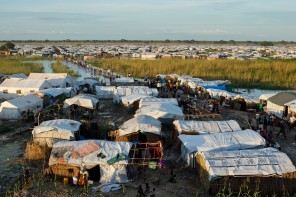For all the information swirling around about Congo these days, this map is interesting. It’s from Ushahidi, which means “testimony” in Swahili, a site designed to aggregate crisis information sent by ordinary people, via emails or–here’s the specialness–SMS. Because cell phones are ubiquitous here, and virtually nothing else is, the SMS is the real key here. The promise is that anyone, anywhere can send a text message about what’s happening, and it will get logged and plotted on a graph.
But take a look at that Congo map. (Sorry, I can’t put it here, but open it in a new tab or window so you don’t leave me behind.) Most reported crime in 2008? Sexual violence.
If you’ve been following Congo news, you no doubt know that sexual violence is one of the biggest problems there. Ben Affleck and Anderson Cooper have magnanimously cast our attention on this crime in eastern Congo, and now phrases like “rape as a weapon of war” are cliche. All good things. I am not, surprise, pro-sexual-violence.
The other thing you news-mongers know about sexual violence in Congo is that people don’t talk about it. Part of the reason it’s been such a secret for so long is that it’s largely unreported. There are all kinds of social costs to admitting you’ve been raped, and in general, women don’t do it.
Enter NGOs who “empower” them. I don’t know what that means–every time I see that word, its definition gets fuzzier to me–but I do know that there are lots of groups doing good work for these women, getting them the treatment they need and connecting them with other services.
So what’s this got to do with the map? Ushahidi says it’s a site of the people, where anyone can report anything. We think what we’re looking at is the cry of the people in a war zone about what’s happening to them.
But what does it say that the most taboo crime in Congo is the most reported on this map? Maybe it says that women, silenced by society, are taking to their cell phones to raise their voices. But I’d put my money on a different scenario: aid groups are the ones sending the text messages.
I don’t just say that to be cynical. I say that because we do need some kind of “citizen journalism” in which ordinary people affected by the situations we read about in the news are able to tell us what is happening to and around them. We journalists, alas, can’t do it all, and usually we don’t even get close.
What we don’t need is to reinforce the echo chamber. Journalists and the public have access to aid groups and their agendas; they’re everywhere, and often they’re doing some good. But journalists, policy-makers, outsiders that may or may not be able to influence what’s going on, or reach the people who do–we need to know whether the information we’re looking at independently corroborates the view we’re already getting from international groups, or whether it’s another wall off of which calls to end the Crime of the Day is bouncing.

